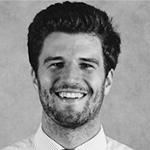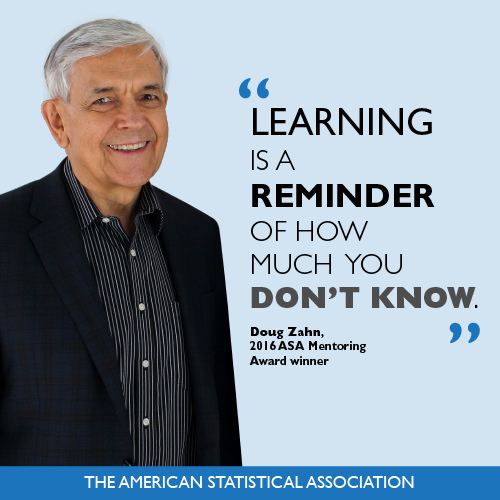The American Statistical Association is accepting applications for its full-time science policy fellow position, a one- or two-year fellowship starting in September 2020 in which a statistician will work to raise the profile of statistics in policy and advocate for evidence-based policymaking.
Based out of the ASA’s office in Alexandria, Virginia, the science policy fellow will work with ASA committees, members, and staff to represent the association’s science policy positions to Congress, the administration, and other stakeholders. To highlight the position and encourage applications, current ASA Science Policy Fellow Daniel Elchert reflects on this unique fellowship and its many benefits.What led you to apply for the ASA Science Policy Fellowship?
During graduate school at the University of Iowa, I conducted various program evaluations and noticed that best practices for these programs are not always implemented. This background led me to believe statisticians are uniquely positioned to describe how concepts like statistical significance and sampling should and should not be applied in the application of a program or policy. The ASA Science Policy Fellowship is an exceptional opportunity to use my training as a statistician to help ensure policies are informed by objective statistical evidence and raise the profile of statistics in evidence-based policymaking.
What have been some important highlights of your fellowship?
There have been many highlights, so this is a difficult question! With that said, here are just a few from my time as the ASA Science Policy Fellow:
- Led and organized dozens of meetings on Capitol Hill, in the administration, and in federal agencies on topics relating to federal statistics and statistical policy
- Consistently collaborated and interacted with leaders from the statistical community, including ASA presidents, Senate-confirmed scientists, and agency heads from principal federal statistical agencies
- Represented the ASA across Washington, speaking publicly at conventions, conferences, and with stakeholder organizations
- Attended New York, et al. vs. United States Department of Commerce, et al. at the United States Supreme Court
- Conducted internal research for the ASA
What have you liked most about the position?
In most scientific disciplines, there is a space between the creation of knowledge (or the science itself) and policy, which I’ll define as how scientific knowledge is then applied to improve lives. Who helps connect these parts to make sure scientific knowledge is integrated to policy? This task is central to the ASA Science Policy Fellowship and what I like most about this position. For nearly two years, I have had the opportunity to collaborate with leaders in the statistics community to advocate for our profession and promote evidence-based policymaking.
Can you describe a typical day at work?
Most weeks, the ASA Science Policy Fellow spends two or three days in Washington representing the ASA at various policy and stakeholder meetings, such as the Coalition for National Science Funding and the Friends of the Institute of Education Sciences. It is also common for the science policy fellow to speak on behalf of the ASA on Capitol Hill and in the administration on issues relating to federal statistics and statistical policy.
On other days, the science policy fellow works from the ASA’s Alexandria office on tasks like writing policy statements ranging from artificial intelligence to climate change and organizing, planning, and collaborating with scientists from varying disciplines to build coalitions and advocate for evidence-based policymaking (e.g., letter-writing campaigns).
Is there time for research during the ASA Science Policy Fellowship?
The focus of the fellowship is on science policy and raising the profile of statistics in evidence-based policymaking. However, there is time for research activities and, as the ASA Science Policy Fellow, I presented at academic conferences, co-managed and authored the ASA’s first survey of master’s graduates, and am currently preparing several manuscripts for publication. More broadly, there are many professional development opportunities available through fellowship.
Why should people consider applying?
The ASA Science Policy Fellowship provides a close look at federal science policy with an emphasis on the role of statistics in evidence-based policymaking. Given this focus, I think statisticians with interests in statistical policy, policy analysis, program evaluation, applied research, and data policy should consider applying.
In the past, science policy fellows have been recent graduates from either a doctoral or master’s degree program in statistics or a closely related discipline, but the position would also be a good fit for mid-career professionals interested in advocating for statistics and evidence-based policymaking in Congress, in the administration, and with stakeholder organizations.
How can interested readers apply?
I encourage all interested applicants with a doctorate or master’s degree in statistics or related discipline to apply. Submit a letter of application not to exceed two pages, a short résumé, writing samples (nontechnical if available), and contact information for three professional references via email to ASA Director of Science Policy Steve Pierson. Applications are being considered on a rolling basis before the September 2020 start date.
What’s your favorite statistics quote?
Statisticians generally agree that models are typically imperfect and seek (at least in part) to explain and/or predict something about the real world. To quote George Box, “All models are wrong, but some are useful.” Similarly, it could be argued that all policies are wrong, but some are useful. This is my favorite statistics quote because I interpret it to suggest that statistical reasoning can be applied to help conceptualize policies and make them more useful.





Leave a Reply